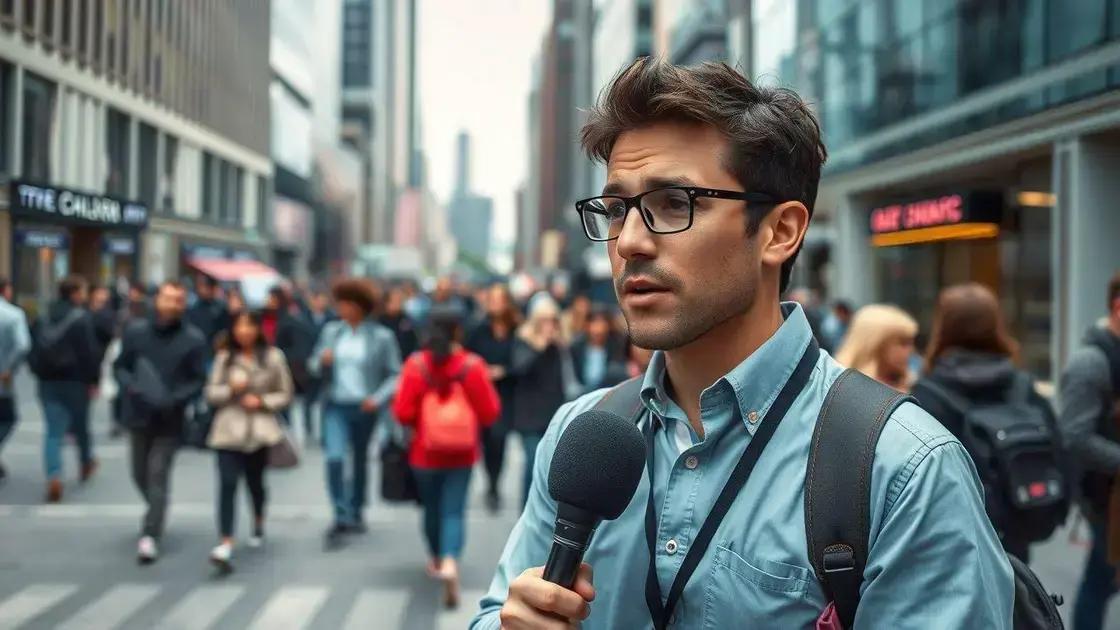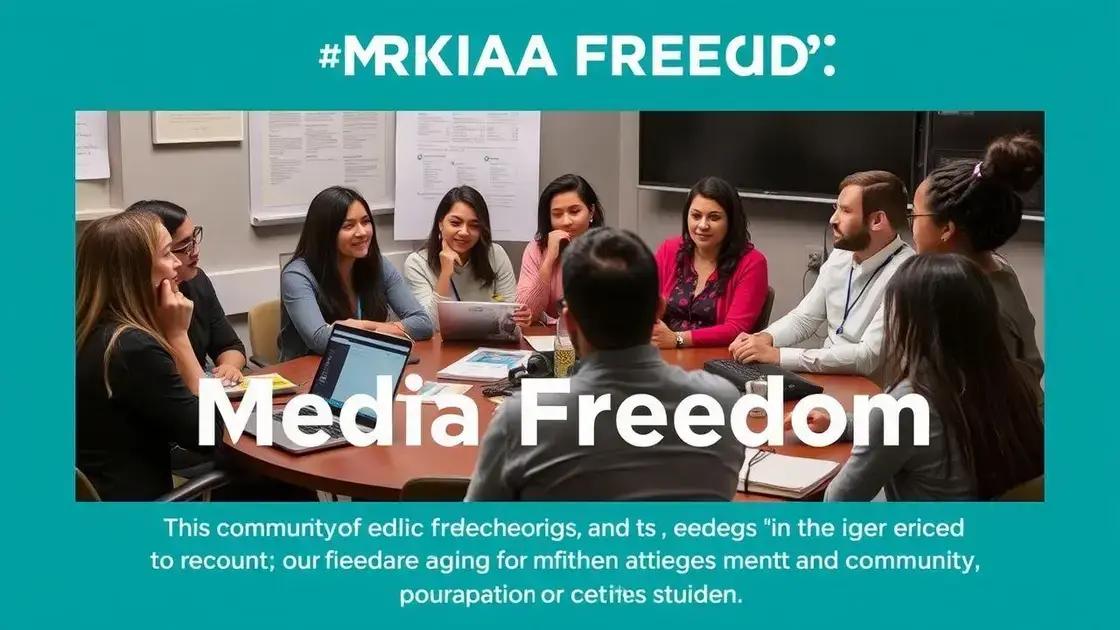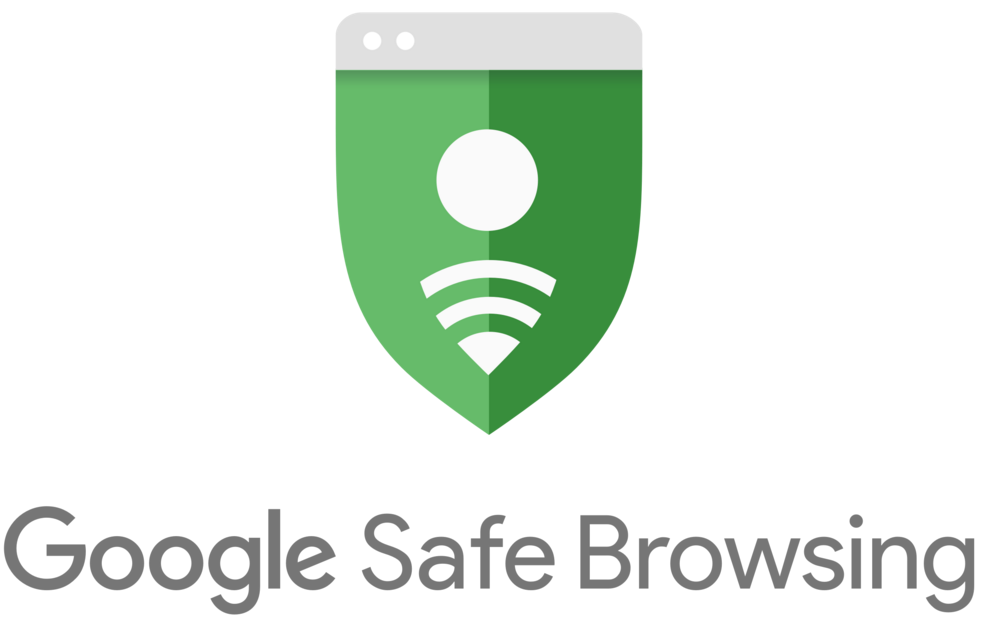Media freedom issues: why they matter now more than ever

Anúncios
Media freedom is essential for democracy, enabling journalists to report truthfully, hold power accountable, and inform the public, while facing threats like censorship, violence, and misinformation.
Media freedom issues are critical in our rapidly evolving info landscape. Have you ever wondered how these challenges influence the news you consume every day? Let’s explore their importance.
Understanding media freedom issues
Understanding media freedom issues is essential for anyone interested in the landscape of journalism today. This topic affects everyone, as the flow of information shapes our society.
Anúncios
The Definition of Media Freedom
Media freedom refers to the ability of journalists and news organizations to report the truth without censorship or fear of retaliation. This freedom is vital for democracy.
Importance of Media Freedom
Why does this matter? When the media is free, citizens are informed and empowered to make decisions. A free press acts as a watchdog on the government and other powerful entities.
Factors Affecting Media Freedom
Many factors influence media freedom, including government policies, public opinion, and the role of technology. Here are some key points:
Anúncios
- Government regulations can impose limits on what journalists can report.
- Public backlash can lead to self-censorship among reporters.
- Technological advances can both help and hinder media freedom.
Social media has transformed how news is shared, allowing for greater accessibility. However, it also raises issues like misinformation and pressure on traditional media outlets.
Global Perspectives on Media Freedom
Different countries experience media freedom in various ways. In some places, journalists face serious dangers, such as arrest or violence. In others, the press enjoys robust protections and the public supports journalistic independence.
Understanding these differences helps illustrate the global landscape of media and its challenges.
Being aware of media freedom issues helps us advocate for a more transparent and accountable media environment. Stay informed, support good journalism, and promote policies that protect press freedom.
The role of journalism in democracy

The role of journalism in democracy cannot be overstated. It serves as a foundation for a functional democratic society by informing citizens and holding power accountable.
Informing the Public
Journalism provides the news that helps people understand their world. Without accurate information, it’s hard for individuals to make informed choices at the ballot box. A well-informed public is crucial for democracy to thrive.
Accountability and Transparency
One of the primary functions of journalists is to expose corruption and injustices. By investigating and reporting on these issues, journalists ensure that those in power are held accountable. This watchdog role fosters transparency in government.
Promoting Civic Engagement
Journalism also encourages civic participation. Articles about local government, activism, and public policies help engage citizens in their community. When people feel informed, they are more likely to participate in democratic processes.
- News reports can motivate people to vote.
- Investigative journalism often highlights social issues needing public attention.
- Editorials can spark debates on critical topics.
The connection between journalism and democracy is evident in the way free press contributes to societal well-being. Strong journalism serves as a check on power and a path for public discourse.
In democratic societies, the freedom of the press allows journalists to operate without fear of censorship or persecution. This environment fosters a diverse range of viewpoints, strengthening the public’s understanding and opinion.
The Consequences of Press Suppression
When journalism is restricted, democracy suffers. Citizens lose access to vital information, leading to disengagement and mistrust of the system. Additionally, a lack of accountability can pave the way for corruption and abuse of power.
Challenges faced by journalists today
Journalists today face numerous challenges that impact their ability to report and inform the public. These obstacles can threaten media freedom and the integrity of news reporting.
Threats to Safety
One of the most alarming issues is the danger journalists encounter. In many parts of the world, they face violence and intimidation for their work. Reports of assault, harassment, and even murder highlight the risks associated with covering sensitive topics, such as politics and war.
Censorship and Legal Issues
Censorship is another significant challenge. Governments can impose restrictions that limit what journalists are allowed to report. Legal threats, like lawsuits and punitive regulations, can stifle freedom of expression. Journalists often navigate a complex landscape of laws that can vary widely by country.
- Many countries have laws that restrict reporting on certain issues.
- Defamation suits can be used to intimidate journalists into silence.
- Access to information is often denied, making research challenging.
In addition to safety and legal concerns, journalists today must also deal with the rapid pace of technological change. The rise of social media has altered how news is disseminated and consumed. While it provides new platforms for reaching audiences, it also leads to the spread of misinformation.
Furthermore, the pressure to produce timely content can compromise journalistic standards. Reporters may feel compelled to prioritize speed over accuracy, risking the credibility of their work.
Financial Strain on News Organizations
Media organizations are also facing economic challenges. With declining revenues from traditional sources, many news outlets struggle to sustain quality journalism. Smaller local outlets are particularly vulnerable, leading to a gap in coverage on vital community issues.
Despite these challenges, journalists remain committed to their mission. They continue to advocate for truth and transparency, making significant sacrifices to ensure the public stays informed.
Case studies of media repression

Case studies of media repression provide valuable insights into how press freedom is challenged around the world. These examples showcase the serious consequences that journalists face when reporting on sensitive issues.
Examples of Notable Cases
One prominent case is that of Jamal Khashoggi, a Saudi journalist murdered in October 2018. His brutal killing sparked global outrage and highlighted the extreme risks journalists encounter in countries with oppressive regimes. This tragedy raised awareness about how authoritarian governments target journalists to silence dissent.
Arrests and Legal Harassment
Another clear example is the situation in Turkey. Following the coup attempt in 2016, thousands of journalists faced arrests and legal harassment. Many media outlets were shut down or taken over by the government. In this environment, freelance reporters live in constant fear of being imprisoned for their work.
- Over 100 journalists were detained in just a few months.
- Media reports critical of the government were systematically censored.
- Independent journalism was undermined, damaging the democratic process.
In Russia, the government has cracked down on independent news sources. The case of Novaya Gazeta, a newspaper known for its critical reporting, illustrates the risks. Its editor, Dmitry Muratov, has faced threats, and some of its journalists have been killed or forced into exile. This has created a chilling effect, discouraging journalists from pursuing stories about corruption or human rights abuses.
The Role of International Response
International reactions to these cases have also been critical. Various human rights organizations and foreign governments have condemned the repression of journalists. For example, the UN and other international bodies have called for accountability for those responsible for attacks on press freedom.
Understanding these case studies helps emphasize the importance of protecting journalists and media freedom. By highlighting these challenges, we can work towards supporting a free press globally and holding oppressive regimes accountable.
Impact of social media on media freedom
The impact of social media on media freedom is profound and complex. In recent years, social media platforms have transformed how news is shared and consumed. While these platforms have opened new avenues for information dissemination, they also pose significant challenges to traditional media.
A New Platform for Voices
Social media provides a voice to many who might otherwise be unheard. Citizen journalists and activists can share news in real time, bypassing traditional media channels. This democratization of information empowers people to report on issues that matter to them.
Challenges of Misinformation
However, the rise of social media is not without its pitfalls. Misinformation and fake news spread rapidly on these platforms, threatening to undermine media credibility. With anyone able to publish content, it becomes challenging for audiences to discern what is true from what is not.
- False information can lead to public panic or misguided beliefs.
- Reputable news outlets often have to compete with sensationalist postings.
- Social media algorithms may favor content that generates outrage over factual reporting.
These challenges complicate the role of journalists, who must work harder to verify the information and maintain their integrity. The speed at which news spreads online can pressure reporters to prioritize quick publication over thorough fact-checking.
The Double-Edged Sword of Censorship
Another important aspect of social media is its role in censorship. Governments and powerful entities can use these platforms to silence dissent, often by removing content that challenges their authority. This creates an environment where press freedom can be easily threatened.
Despite these issues, social media remains a vital tool for many journalists. It offers a way to reach audiences directly and engage with them on critical issues. As the landscape continues to evolve, finding ways to uphold media freedom while navigating the challenges of social media will be essential for journalists and society.
Steps to support media freedom

Supporting media freedom is essential for maintaining a healthy democracy. There are several steps individuals and organizations can take to help protect journalists and their work.
Advocate for Stronger Laws
One of the first steps is to advocate for stronger legal protections for journalists. This can include pushing for laws that defend press freedom and penalize attacks against journalists. Public support can influence lawmakers to prioritize press-related issues.
Support Independent Media
Another important action is to support independent media outlets. These organizations often face financial difficulties due to a lack of advertising revenue. By subscribing to, donating to, or promoting independent news organizations, individuals can help ensure diverse voices are heard.
- Consider subscribing to local newspapers or online publications.
- Promote independent media on social media platforms.
- Participate in fundraising efforts to support quality journalism.
Engagement in community forums can also be beneficial. Attending or organizing discussions on media freedom raises awareness about the challenges facing journalists today. Sharing articles and information can provide others with the tools to understand media issues better.
Educate Yourself and Others
Education is another powerful tool. Learning about media literacy helps individuals discern trustworthy news from misinformation. By educating friends and family about the importance of media freedom and how to verify news sources, communities can become more informed and supportive.
Becoming involved in local, national, or international campaigns that highlight issues related to media repression can amplify efforts. Support organizations that work to protect journalists, such as the Committee to Protect Journalists or Reporters Without Borders. These organizations often run meaningful initiatives to safeguard press freedom.
By taking these steps, everyone can play a role in fostering an environment where journalism can thrive, ultimately supporting democracy and informed communities.
In conclusion, supporting media freedom is crucial for a healthy democracy. By advocating for strong laws, supporting independent media, and educating ourselves and others, we can help protect journalists and ensure the free flow of information. Every effort counts in creating an environment where journalism can thrive, allowing communities to stay informed and engaged. Together, we can stand up for press freedom and safeguard democracy for future generations.
FAQ – Frequently Asked Questions about Media Freedom
Why is media freedom important?
Media freedom is vital for democracy as it allows journalists to report truthfully, hold power accountable, and inform the public.
What are some threats to media freedom?
Threats include censorship, legal harassment, violence against journalists, and government repression.
How can I support media freedom?
You can advocate for strong laws, support independent media, and educate others about the importance of press freedom.
What role does social media play in media freedom?
Social media can empower voices and spread information but also promotes misinformation and can lead to censorship.







